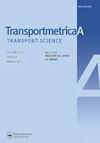对城市轨道交通系统的性能进行基准测试:一个机器学习应用
IF 3.1
2区 工程技术
Q2 TRANSPORTATION
引用次数: 0
摘要
城市轨道交通系统在异构环境中运行,其性能受到许多外生因素的影响。然而,传统的基准测试方法假设许多这些因素具有同质性,这可能导致误导性的性能比较。本研究通过系统的数据驱动方法为交通基准研究文献提供了方法学上的贡献,该方法适应了URT之间的异质性。使用了2016年36个URT系统的独特国际数据集。通过机器学习算法,根据操作性能指标对运营商进行聚类,从而实现性能的同类比较。然后使用带自举的数据包络分析来评估操作人员在集群内的效率表现。此外,运用方差分析和事后检验来探讨绩效不同方面之间的变化和相关性。我们的聚类结果证实了系统的自然地理分组。此外,我们强调了运输部门服务质量定义的复杂性。本文章由计算机程序翻译,如有差异,请以英文原文为准。
Benchmarking the performance of urban rail transit systems: a machine learning application
Urban rail transit (URT) systems operate in heterogenous environments where their performance is affected by many exogenous factors. However, conventional benchmarking methods assume homogeneity of many of these factors which could result in misleading comparisons of performance. This study provides a methodological contribution to the transit benchmarking literature through a systemic data-driven method which accommodates heterogeneity among URT. A unique international dataset of 36 URT systems in year 2016 is utilised. Operators are clustered based on indicators of operational performance through machine learning algorithms which enables like-for-like comparisons of performances. Data envelopment analysis with bootstrapping is then used to evaluate operators’ efficiency performance within a cluster. Further, ANOVA and post-hoc tests are applied to explore variations and correlations among different aspects of performance. Our clustering results corroborate the natural geographic grouping of the systems. Further, we highlight the complexity of the definition of service quality in the transit sector.
求助全文
通过发布文献求助,成功后即可免费获取论文全文。
去求助
来源期刊

Transportmetrica A-Transport Science
TRANSPORTATION SCIENCE & TECHNOLOGY-
CiteScore
8.10
自引率
12.10%
发文量
55
期刊介绍:
Transportmetrica A provides a forum for original discourse in transport science. The international journal''s focus is on the scientific approach to transport research methodology and empirical analysis of moving people and goods. Papers related to all aspects of transportation are welcome. A rigorous peer review that involves editor screening and anonymous refereeing for submitted articles facilitates quality output.
 求助内容:
求助内容: 应助结果提醒方式:
应助结果提醒方式:


